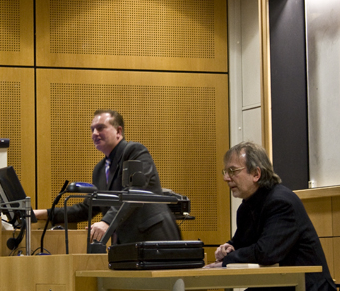
Correction: In a previous version of this article we said that BBC studios in London “had often filled in for places like Afghanistan and Iceland”. We misinterpreted Michael Ford’s meaning, and only scripted introductions to pieces recorded on location might have been re-recorded in the studios.
We also described him as “a former BBC Radio 4 presenter”. He was a producer, and is still a presenter. We regret the errors.
Michael Ford, a former BBC Radio 4 producer and a visiting fellow at the Lincoln School of Journalism (LSJ), gave a talk on journalistic ethics in the Cargill lecture theatre on Monday, November 30th.
His focus on journalistic ethics was centred around certain practices he had encountered working for BBC radio. He posed a range of ethical questions to the audience, which consisted mainly of journalism students.
Ford is now an independent writer and broadcaster. He has trained as both a journalist and a theologian, and holds a PhD in “spiritual theology”.
The examples he gave centred largely around re-recording parts of radio pieces, the editing of recordings, and adding extra sound effects to increase the effect of radio journalism or mute film.
“I think these days journalism has tended to lack a strong underlying ethical framework,” he said. This could pose problems because “every story has potential ethical implications”.
Journalists should also avoid being aggressive towards interviewees, he said. “Whoever we interview we have to respect their dignity,” no matter if the journalist agreed with the person’s views or not.
“The Universal Declaration of Human Rights focused on the need for all of us to respect the human dignity of the individual,” he said, and journalists should remember this when chasing stories.
“It’s my belief that every student [journalist] should study for several months… moral philosophy,” he said, and he went on to say that journalistic ethics do “not appear to draw on any traditional philosophical field”.
Instead, it mainly consisted of codes of conduct drawn up by editors and other professional bodies, and that the focus was very much on “professional” behaviour.
Ford was meant to be joined by Tessa Mayes, an investigative journalist who works for the Spectator and a visiting fellow at the LSJ, but was unable to make it. Mayes also had to cancel when she was slated to appear alongside Bridget Kendall in March this year.
Ford said: “It’s a great privilege to come back to Lincoln.” A year ago he had come to Lincoln to give a lecture to journalism students, as part of the same “Journalists speak out on journalism” series.
